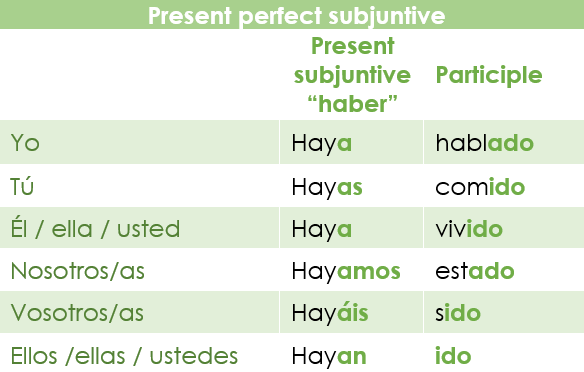Subjunctive of haber
By using this form you agree with the storage and handling of your data by this website, subjunctive of haber. The verb haber can be used in two separate ways:. However in many dialects of Spanish and especially in spoken Spanish the forms of haber also agrees with the noun. Compare the two variations of the same sentence below.
The haber conjugation is quite tricky. Ready to learn about the conjugation of haber? Today we will show you how to conjugate haber as an impersonal and auxiliary verb. Pay close attention to the conjugations we will show you today because they are all a little different from each other. Haber is a very special Spanish verb. It is equivalent to the auxiliary verb have.
Subjunctive of haber
To have auxiliary Irregular Verb Top Please accept the privacy policy. Thank you! We have sent the PDF to your email. Haber is the Spanish verb meaning "to have". It is a very unique verb in that it is used in compound tenses as an auxiliary, meaning that is comes before the main verb in the sentence and is used to set the main verbs' tense or mood. For example: He estado I have been , hemos comido we have eaten. For example: Hay mucho chocolate en el armario. There is a lot of chocolate in the press. As an auxiliary verb, haber in the indicative present is used to form the "indicative present perfect" tense. For example, " he escrito la carta ", meaning " I have written the letter ". The red dot above denotes an irregular conjugation.
Want a better way to learn conjugations? Spanish resources for kids of all ages.
Haber is an auxiliary verb, which means it helps other verbs express their tense or mood. Read on to learn how to use haber —including haber conjugations, meanings, usages and more—as an impersonal verb, an auxiliary verb and a participle. And One More Thing…. Download: This blog post is available as a convenient and portable PDF that you can take anywhere. Click here to get a copy. Haber can take the form of an impersonal verb , an auxiliary verb or a past participle, and can be used in the following ways:.
Haber is an auxiliary verb, which means it helps other verbs express their tense or mood. Read on to learn how to use haber —including haber conjugations, meanings, usages and more—as an impersonal verb, an auxiliary verb and a participle. And One More Thing…. Download: This blog post is available as a convenient and portable PDF that you can take anywhere. Click here to get a copy. Haber can take the form of an impersonal verb , an auxiliary verb or a past participle, and can be used in the following ways:. Remember that as an impersonal verb a verb that does not have a true subject , haber indicates existence and is always conjugated in the third-person form. Hay demasiada tristeza en las noticias.
Subjunctive of haber
Haber is an auxiliary verb in Spanish. In Spanish, haber needs a complement in order to provide any meaning. As an auxiliary verb, haber must be combined with other verbs. Haber conjugations in the present tense are formed with the stem h and both -AR and -ER present endings. Hay is the impersonal form of haber in the present tense. We conjugate this verb to this tense to formally express obligation or to form the indicative present perfect tense. In this context, you must use the verb tener instead.
Allow me to reintroduce myself lyrics
However, you may prefer to disable cookies on this site and on others. Never use haber in plural forms to express existence. There are two dishes on the table. Today we will show you how to conjugate haber as an impersonal and auxiliary verb. There was an explosion in the factory. Four years [studying Spanish] and after just a couple of days with this app I finally am 'getting' the verb thing into my head. There were three ice creams. Short Stories. Hay muchas fiestas en mi casa. See also: Conjugate regular -ar verbs in the present subjunctive in Spanish El Presente de Subjuntivo and Conjugate regular -er and -ir verbs in the present subjunctive in Spanish El Presente de Subjuntivo. The haber conjugation is quite tricky. Expires at the end of this month. Gracias a todos lo que me han.
The haber conjugation is quite tricky. Ready to learn about the conjugation of haber? Today we will show you how to conjugate haber as an impersonal and auxiliary verb.
Compare the two variations of the same sentence below. Hubieres You will have. Option 1. FluentU uses a natural approach that helps you ease into the Spanish language and culture over time. After the first couple of lessons I finally feel comfortable conversing with the natives here in Panama. I want to have a good president in the country. Save my name, email, and website in this browser for the next time I comment. February Sale: Learn a language with fun videos or any Netflix video. Haber can also be used as an auxiliary verb. Haber in the Indicative Informal Future Because haber is an auxiliary verb used to form compound conjugations, it is not used in this tense.


I apologise, but, in my opinion, there is other way of the decision of a question.
Leave me alone!
You have hit the mark. It seems to me it is good thought. I agree with you.